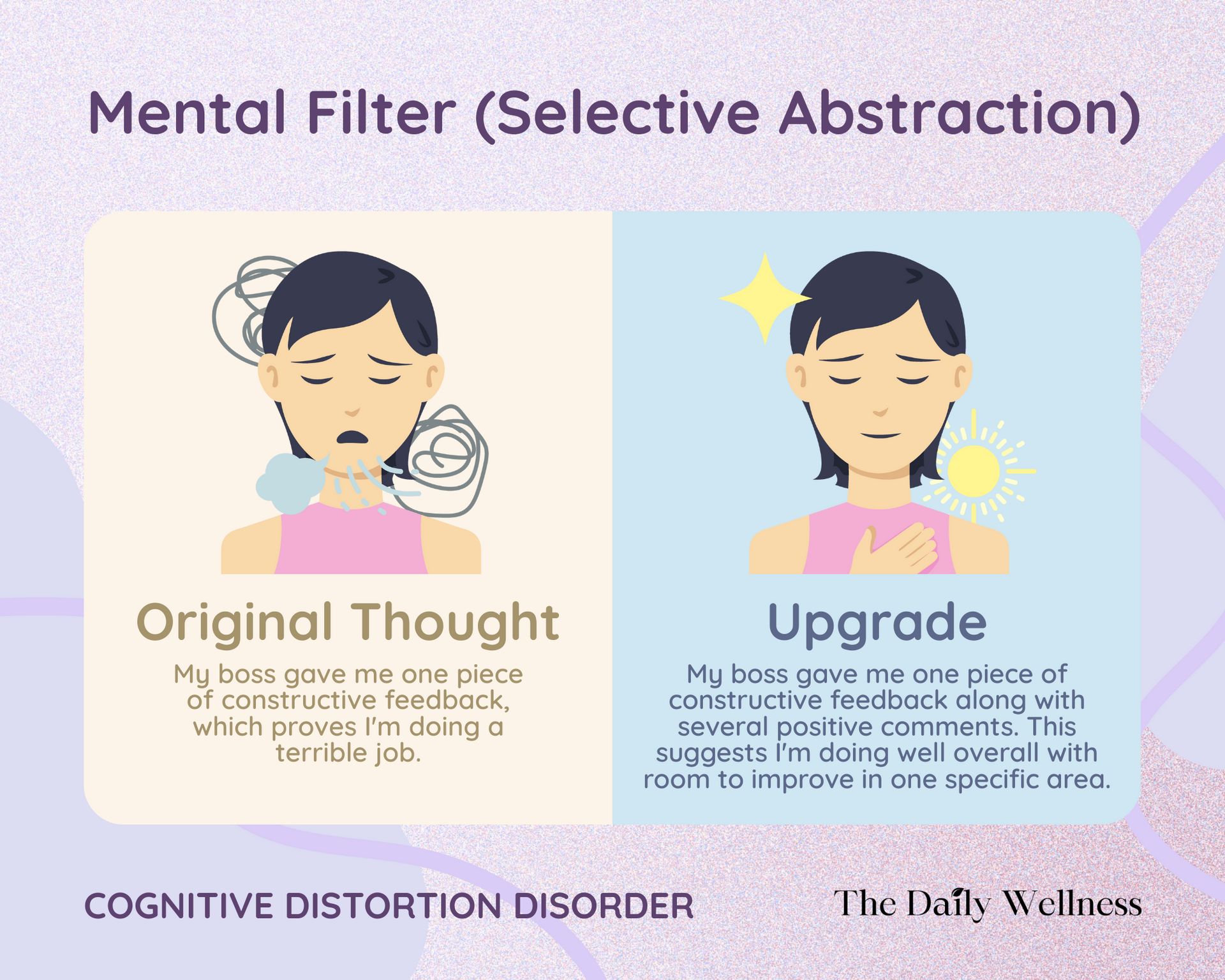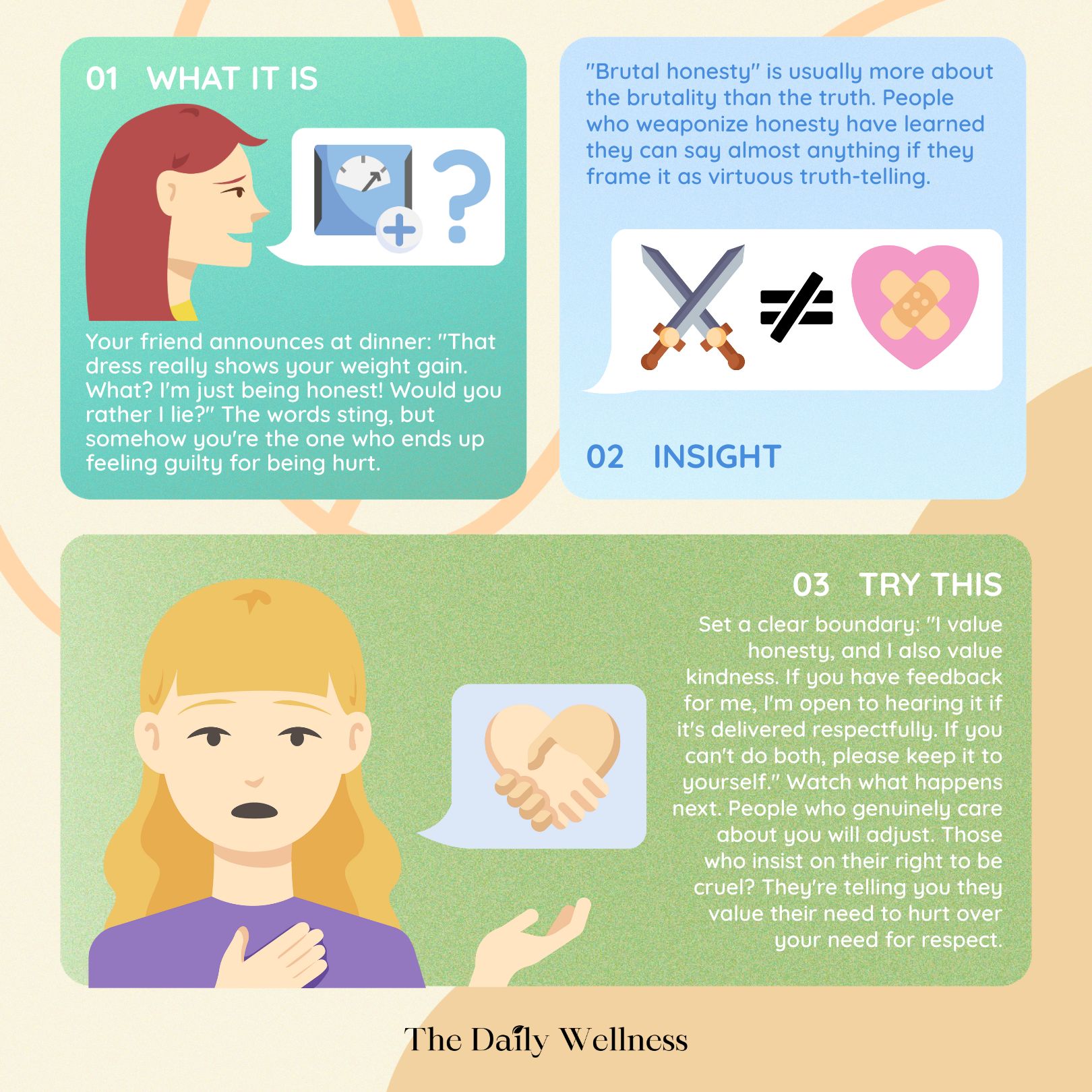If “I’m just being honest” has ever cut deep, this edition helps you protect your dignity without losing your grace.
Today's Quick Overview:
💞 Relationship Minute: A kinder boundary for “I’m just being honest…
🧠 Cognitive Distortion Detector: How Mental Filter makes you zoom in on one negative detail…
📰 Mental Health News: AI chatbots, more U.S. colleges allow pets in dorms, and toxic algal blooms linked to mental distress spikes...
🍽️ Food & Mood: This surprising nutty brain-friendly Food & Mood note…

Let's take your midweek temperature right now:
Are you running a little hot with urgency? Cool and steady? Fluctuating between bursts of focus and dips of frustration? However your Wednesday feels, let it set the pace: hot energy needs outlets, cool energy needs gentleness, and mixed energy needs patience.
QUICK POLL
Sometimes it’s not the big changes, but the smallest ones that move us forward.
Which Kind of “Micro-Shift” Feels Most Doable for You Today?
FREE MENTAL HEALTH GIFT
6 Types of Trauma Healing Poster

Discover a free, trauma-informed self-care guide designed to help you reconnect with your needs in a gentle, structured way.
This printable resource introduces six supportive categories of self-care: emotional, mental, physical, social, practical, and spiritual, each with actionable ideas tailored for those on a healing journey.
How to get it today: reply to this email with “August 27, 2025.” We’ll send your file within 24–30 hours.
COGNITIVE DISTORTION DETECTOR
Mental Filter (Selective Abstraction)

What it is: Mental Filter is when you zoom in on one negative detail from a situation and ignore all the positive aspects around it. You take that single piece of negative information and use it to define the entire experience.
What it sounds like:
"That one critical comment proves I'm terrible at my job" (ignoring all the positive feedback).
"I stumbled over that one word, so the whole presentation was a disaster."
"She didn't text me back right away; she must hate me."
"I got one answer wrong, so I failed the whole test."
"He seemed distracted when I was talking; I must be boring."
Why it's a trap: By focusing only on one flaw, you cancel out the bigger picture. You miss chances to feel proud, learn from positives, or see your performance fairly. Over time, this pattern leaves you discouraged, even in situations that were mostly good.
Try this instead: When you catch yourself fixating, pause and ask: “What else happened?”
List three other things from the situation, especially anything neutral or positive.
Ask yourself: “If a friend told me this story, would I only point out the negative, or would I help them see the whole picture?”
Practice giving yourself the same fairness you’d offer someone you care about.
Today's Thought Tweak
Original thought: "My boss gave me one piece of constructive feedback, which proves I'm doing a terrible job."
Upgrade: My boss gave me one critique along with several positives. I’m doing well overall, with one area to improve.”
The shift moves you from tunnel vision on the negative to a balanced view of the complete situation.
RELATIONSHIP MINUTE
When Someone Uses "I'm Just Being Honest" to Be Cruel

The Scenario: Your mother-in-law says your parenting is "creating spoiled kids," then adds, "I'm just being honest because I care." Your friend announces at dinner: "That dress really shows your weight gain. What? I'm just being honest! Would you rather I lie?" The words sting, but somehow you're the one who ends up feeling guilty for being hurt.
The Insight: “Brutal honesty” is rarely about truth; it’s about brutality. People who weaponize honesty hide behind the virtue of “telling it like it is” while using it as a license to criticize. Real honesty balances clarity with care: it asks, Is this necessary? Is this kind? Is this helpful?
The Strategy: Don’t get trapped debating whether their words are “true.” Instead, address the delivery:
“You may believe you’re being honest, but the way you said that feels hurtful.”
“Honesty without kindness isn’t honesty, it’s cruelty. If you have feedback, I need it shared respectfully.”
If they counter with, “You just can’t handle the truth,” you can reply: “I can handle honesty. What I won’t accept is honesty used as an excuse for cruelty. There’s a difference.”
Why It Matters: This dynamic can erode your boundaries. You may start believing hurtful words are “necessary truths” and doubt your right to object. Over time, that either makes you armor up, which leads to you losing openness, or internalize unkindness as fact.
Try This Next Time: Set a boundary that affirms both values: “I welcome honesty, and I also value kindness. If you can’t offer both, please keep it to yourself.” People who care will adjust. People who don’t are showing you their need to be harsh matters more than your need for respect.
MENTAL HEALTH NEWS
AI chatbots’ suicide answers inconsistent; family sues OpenAI. A new study finds popular chatbots often dodge or inconsistently handle suicide-related questions, as a California family files a separate lawsuit alleging ChatGPT contributed to their teen’s death.
More U.S. colleges allow pets in dorms to ease student stress. A growing number of campuses now permit pets (beyond service and support animals) to help reduce anxiety, homesickness, and loneliness among students.
Toxic algal bloom linked to spikes in mental distress in Australia. As a “massive” bloom grips South Australian coast, local clinicians report rising anxiety and stress; researchers warn climate change could make such events and their mental health fallout more common.
DAILY PRACTICE
Today’s Visualization Journey: Sculpture Garden at Midday

Walk slowly through an outdoor sculpture garden where bronze, stone, and wildflowers share the same quiet space. Each piece changes as you circle it; shadow becomes shape, and what looked sharp from one angle softens from another. You don’t have to understand every piece to appreciate it; you just need to keep moving around it, letting perspective do its gentle work.
Make it yours: What’s one situation this week that might look different if you stepped two paces to the left: asked one more question, took a breath, or slept on it?
Today’s Affirmations
"I can feel uncertain about big decisions and still trust myself to figure it out."
Uncertainty doesn’t mean you’re incapable; it means you’re being thoughtful. Trust that clarity often comes through movement, not before it.
Try this: When faced with a decision, tell yourself: “I may not know the perfect choice, but I trust myself to choose well and adjust as I go.” Focus on your capacity to adapt, not on predicting every outcome.
Gratitude Spotlight
Today's Invitation: What routine task went smoothly for you this week? Maybe you kept up with laundry, replied to messages, or showed up for something even when you didn’t feel like it.
These ordinary acts are easy to overlook, but they’re proof of competence and care. Quiet consistency is a form of self-support.
Try This: When you recognize a responsibility you handled well, pause and acknowledge it. Tell yourself: “I took care of what needed care.” Let that reliability count as something worth appreciating.
WISDOM & CONTEXT
"The place to find who you are is where you stand." — George Mumford
Why it matters today: We often imagine that self-discovery lives in a different job, a new relationship, or some better future. But Mumford reminds us: identity is revealed in how you meet the moment you’re in now.
Bring it into your day: Instead of waiting for clarity later, notice who you are in this situation. How do you respond under stress? What priorities guide you? What qualities emerge when no one’s watching?
The person you’re becoming starts with the choices you make right here, today.
THERAPIST-APPROVED SCRIPTS
When Your Partner Always Wants to Split Everything Exactly 50/50

The Scenario: Your partner insists on splitting every expense exactly in half, whether or not it makes sense.
They want to divide grocery bills equally, even if you don’t eat the pricey items, split restaurant checks down the middle when they’ve ordered more, or treat every shared cost as identical, even though your incomes or usage differ.
What feels “fair” to them ends up feeling rigid and transactional to you.
Try saying this: "I appreciate that you want things to be fair between us financially. The way we're splitting things isn't feeling equitable to me because it doesn't account for our different incomes or who actually benefits from purchases. Can we talk about a system that feels more balanced?"
Why It Works:
Acknowledges intent: You show you understand they’re aiming for fairness, not exploitation.
Reframes fairness: It clarifies that equal isn’t always equitable.
Grounds it in reality: Specific examples highlight why the system isn’t working.
Invites teamwork: You’re opening a problem-solving conversation, not an argument.
Pro Tip: If they insist, “Equal is the fairest way,” try reframing: “Equal doesn’t always mean fair when our circumstances are different. What if we looked at what percent of income each of us contributes? That way it scales to what’s realistic for both of us.”
Fairness isn’t about symmetry; it’s about balance that both partners can sustain without resentment.
FOOD & MOOD
Spotlight Ingredient: Sesame Seeds
Sesame seeds may be tiny, but they pack a surprising mental boost. They’re one of the richest sources of tyrosine, an amino acid your brain turns into dopamine, the chemical that fuels focus, alertness, and motivation. Just a couple of spoonfuls can give your brain a steady stream of raw material to stay sharp.
But tyrosine is only part of the story. Sesame seeds also bring zinc (helps your brain make neurotransmitters), magnesium (protects brain cells from stress), and vitamin B6 (supports mood-regulating brain chemistry). Together, these nutrients work like a team: magnesium helps your body absorb B6, while zinc helps tyrosine convert into dopamine.
How to use them: Sprinkle 2–3 tablespoons of sesame seeds (or a spoonful of tahini) on salads, roasted veggies, or grain bowls for a daily brain-friendly boost.
Simple Recipe: Sesame-Crusted Sweet Potato Brain Bowl
Prep time: 25 minutes | Serves: 2
Ingredients:
2 medium sweet potatoes, diced
1 tablespoon olive oil
3 cups baby spinach
2 tablespoons tahini
1 tablespoon fresh lemon juice
1 teaspoon honey
2 tablespoons warm water
4 tablespoons toasted sesame seeds
Sea salt to taste
Steps:
Dice 2 medium sweet potatoes and toss with 1 tablespoon olive oil.
Roast at 400°F for 20 minutes.
Meanwhile, whisk together 2 tablespoons tahini, 1 tablespoon lemon juice, 1 teaspoon honey, and 2 tablespoons warm water until smooth.
Divide 3 cups baby spinach between bowls, top with roasted sweet potatoes, drizzle with tahini sauce, and finish with 2 tablespoons toasted sesame seeds per bowl and a sprinkle of sea salt.
Why it works: The sweet potatoes give slow-burning carbs, while sesame’s tyrosine and B6 support steady dopamine release for focus and mood.
Mindful Bite: Notice the crunch of the seeds, like tiny bells, against the earthiness of sweet potato. Slow chewing lets the flavors unfold and reminds you: small things can nourish in big ways.
WEEKLY JOURNAL THEME
Your 3-Minute Writing Invitation: "What’s one area where I’ve been comparing myself to others that would benefit from focusing on my own progress instead?"
Why Today's Prompt Matters: Midweek is a good time to notice how comparison sneaks in. Writing for just a few minutes about where you could redirect that energy—back into your own growth—can bring relief and a clearer sense of direction.
TODAY'S PERMISSION SLIP
Permission to Keep Some Parts of Your Life Private
You’re allowed to have experiences, thoughts, and struggles that you don’t post online, discuss with friends, or even share with family.
Why it matters: Constant sharing can make privacy feel selfish or secretive, but some things are meant to be held quietly. Protecting parts of your life that belong only to you helps you stay grounded in your own sense of self, not just other people’s opinions.
If you need the reminder: You don’t owe anyone access to every corner of your inner world. Sometimes the most meaningful experiences are the ones you hold close, undocumented and unspoken.

Tonight's Gentle Review
Invite the day to exhale by asking yourself:
What have I been worrying about this week that's actually outside my control?
Where did I surprise myself with patience when things didn't go as planned?
What feels clearer or more settled now than it did at the beginning of this week?
Release Ritual: Write down one thing you're grateful for on a small piece of paper. Fold it and place it somewhere you'll see it tomorrow - in your pocket, on your mirror, or in a book. Let this small act plant seeds of appreciation for what's already working.
TOMORROW’S MICRO-COMMITMENT
Prompt: Your comfort zone isn't a prison; it's a home base you can return to after small adventures. Tomorrow, take one tiny step toward something that interests you, knowing you can always step back.
Examples:
I'll say hello to someone new, even if it's just the person walking their dog.
I'll try one small thing I've been curious about for five minutes.
I'll speak up in one conversation where I usually stay quiet.
WANT TO CONTRIBUTE TO OUR NEWSLETTER?
Are you a therapist, psychologist, or mental health professional with something meaningful to share?
We're opening up space in our newsletter for expert voices from the field — and we'd love to hear from you.
Whether it’s a personal insight, a professional perspective, or a practical tip for everyday mental health, your voice could make a difference to thousands of readers.
👉 Click here to apply to contribute — it only takes 2 minutes.
THURSDAY’S PREVIEW
Coming Thursday: What to say when your friend keeps asking you to lie for them and you're tired of being pulled into their deception.
MEET THE TEAM
Love what you read? Share this newsletter with someone who might benefit. Your recommendation helps our community grow.
*The Daily Wellness shares educational content only and is not a substitute for professional medical or mental health advice and diagnosis. Please consult a licensed provider for personalized care.